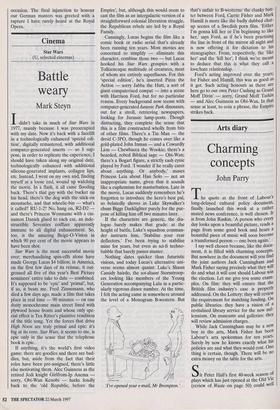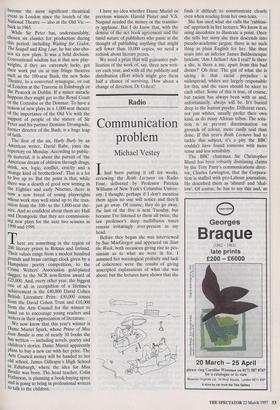Arts diary
Charming concepts
John Parry
The quote at the front of Labour's long-delayed cultural policy document, finally launched this week at a rather muted news conference, is well chosen. It is from John Ruskin. `A person who every day looks upon a beautiful picture, reads a page from some good book and hears a beautiful piece of music will soon become a transformed person — one born again.'
I say well chosen because, like the docu- ment, it is filled with charming concepts. But nowhere in the document will you find the joint authors Jack Cunningham and Mark Fisher saying precisely what they will do and what it will cost should Labour win the election. Let me give you some exam- ples. On film: they will ensure that the British film industry's case is properly addressed. On the Lottery: they will review the requirement for matching funding. On public libraries: they have a vision ofa revitalised library service for the new mil- lennium. On museums and galleries: they will review admission charges.
While Jack Cunningham may be a new boy in the arts, Mark Fisher has been Labour's arts spokesman for ten years. Surely by now he knows exactly what his policies are and what they would cost. One thing is certain, though. There will be no extra money on the table for the arts.
Sir Peter Hall's first 40-week season of plays which has just opened at the Old Vic (review of Waste on page 50) could well become the most significant theatrical event in London since the launch of the National Theatre — also at the Old Vic back in 1963.
While Sir Peter has, understandably, chosen six classics for production during this period, including Waiting for Godot, The Seagull and King Lear, he has also cho- sen six new plays. It was a bold decision. Conventional wisdom has it that new play- wrights, if they are extremely lucky, get their work put on at tiny fringe theatres such as the 100-seat Bush, the new Soho Theatre, in a converted synagogue, or out of London at the Traverse in Edinburgh or the Peacock in Dublin. If a minor miracle happens they might get to the Royal Court or the Cottesloe or the Donmar. To have a season of new plays in a 1,000-seat theatre of the importance of the Old Vic with the support of people of the stature of Sir Peter and his partner Dominic Dromgoole, former director of the Bush, is a huge leap of faith.
The first of the six, Hurly Burly by an American writer, David Rabe, joins the repertory on Monday. According to public- ity material, it is about the pursuit of 'the American dream of oblivion through drugs, drink, sex, logic, conflict, cruelty and a strange kind of brotherhood'. That is a lot to live up to. But the point is that, while there was a dearth of good new writing in the Eighties and early Nineties, there is now a new breed of young playwrights whose work may well stand up to the tran- sition from the 100- to the 1,000-seat the- atre. And so confident about them are Hall and Dromgoole that they are commission- ing new plays for the next two seasons in 1998 and 1999.
There are something in the region of 200 literary prizes in Britain and Ireland. Their values range from a modest hundred Pounds and brass carriage clock given by a Hampshire poetry competition, to the Crime Writers' Association gold-plated dagger, to the NCR non-fiction award of £25,000. And, every other year, the biggest one of all in recognition of a lifetime's achievement is the £40,000 David Cohen British Literature Prize: £30,000 comes from the David Cohen Trust and £10,000 from the Arts Council for the winner to hand on to encourage young readers and writers in their appreciation of literature. We now know that this year's winner is Dame Muriel Spark, whose Prime of Miss Jean Brodie is one of nearly 30 books she has written — including novels, poetry and Children's stories. Dame Muriel apparently Plans to buy a new car with her prize. The Arts Council money will be handed to her Old school, James Gillespie's High School In Edinburgh, where the idea for Miss Brodie was born. The head teacher, Colin Pinlayson, is planning a book-buying spree and is going to bring in professional writers to talk to the children. I have no idea whether Dame Muriel or previous winners Harold Pinter and V.S. Naipaul needed the money or the transito- ry applause. But I do know that, with the demise of the net book agreement and the timid nature of publishers who panic at the thought of publishing anything that might sell fewer than 10,000 copies, we need a rethink about literary prizes.
We need a prize that will guarantee pub- lication of the work of, say, three new writ- ers each year, and with all the publicity and distribution effort which might give them half a chance of surviving. How about a change of direction, Dr Cohen?



































































 Previous page
Previous page